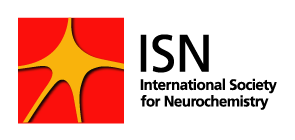Funds for research for young investigators who are long-term ISN members to establish themselves as independent researchers.
Application guidelines for the ISN Career Development Grants (CDG)
This scheme provides funds for research supplies, small instrumentation or participation in scientific conferences (max. 20% of the total grant) to support committed ISN members who are young investigators to establish themselves as independent researchers. ISN acknowledges national and regional differences on the way to reach scientific independence. To reflect this and to provide equal opportunities to members from all regions, this funding scheme is open to scientists who have very recently become independent researchers, or who have the demonstrated capacity to become independent.
Project duration and grant volume:
- Up to USD 10,000 can be granted per successful CDG application, depending on the budget of the relevant research project.
- The project should be developed in one or two years.
- Grants can be spent on lab equipment, but also on other project-related items like consumables, accessing facilities, or animal housing costs.
- A maximum of 20% of the total funds granted can be used to cover costs related to attend an ISN-related event, such as the biennial meeting, ISN-sponsored conferences, symposia or satellite meetings and sister society (APSN, ASN, ESN) meetings but not for meetings/conferences/workshops that are not related to ISN.
- Only committed advanced ISN Postdoc Members (with a minimum 3 years’ experience as postdoctoral fellow) and Full Members (up to 10 years after the year the doctoral degree was awarded) are eligible to apply. Allowance may be made for career breaks based on ISN’s Career Interruption Policy. Reasons, durations and consequences of career interruptions for the applicant must be given in the application form and supporting documentation attached, where appropriate.
- The applicant must be an active ISN member continuously for at least 4 years (48 months) at the deadline of a given application round. In addition, funds can only be transferred, if the successful applicant is also an active member in the year(s) when the project will be carried out.
- Members who have not continuously renewed their ISN membership each year (as indicated by open membership dues for previous years or periods of delayed payment that were connected with periods of inactive ISN membership) are excluded from applying. Note that payment of back membership fees does not restore active membership.
- Applicants should provide a statement detailing evidence of their independence or evidence supporting their capacity to become independent researchers, signed by the Department chair of the applicant.
- A successful applicant is not eligible to apply for a second project supported by CDG.
Click here to see the detailed CDG Guideline which have been updated as of September 2021.
Payment and reporting requirements:
- 80% of the amount granted will be transferred to a bank account of the applicant’s institution. That institution must the same as the institution named in the recommendation letter. Transfer to any private or individual bank account is not possible.
- The remaining 20% will be released after the full research and financial report has been submitted by the applicant and is approved by ISN.
- The Institution must agree that no indirect costs/overheads will be charged.
- ISN expects that applicants secure additional funding from their home institution or from other funding bodies, however, redundant funding is not allowed. How ISN and other funding is planned to be expended should be detailed in the budget.
- A detailed written report (including a financial report) is required to be submitted by the successful applicant within two months after the completion of the project.
- The supported ISN member is expected to acknowledge ISN support and briefly inform audiences about ISN and about the benefits of an ISN membership when presenting data at seminars and/or scientific meetings.
- The supported ISN member is encouraged to present data at ISN-related events (ISN biennial meetings, sister societies’ meetings, small conferences that are supported by ISN-CC).
Application:
- The application deadline is October 31 for proposals starting the year after.
- Application criteria are
- eligibility of the candidate (see above)
- scientific quality of the applicant and the project
- Applications include 2 documents to be submitted as a single PDF:
- Completed and signed application form with
- career information of the applicant with a publication list and list of previous awards including previous ISN funding
- a project description (3 pages max.),
- a budget calculation for the project, including information on other external funds made available/requested for the same purpose, including those requested from local sources.
- a letter signed by the department chair confirming the applicant’s research independence and agreement that no indirect costs/overheads will be charged by the institution.
Applications should be sent as a single PDF named [lastname]_CDG_[year].pdf to the Career Development Committee Chair
Prof. Dr. Constanze Seidenbecher
cseidenb@lin-magdeburg.de
HOW TO SUCCESSFULLY APPLY FOR A CAREER DEVELOPMENT GRANT
CDG Awardees
Giulia Costa
Project Title: Revealing sex differences in amphetamines-related ageing disorders
Sandra Vaz
My name is Sandra Vaz and I am a researcher at the Instituto de Medicina Molecular João Lobo Antunes, Lisboa (Portugal). My main research interest is the tripartite synapse, namely the regulation of synaptic activity by astrocytes through the bidirectional communication between neurons and astrocytes. Namely, together with my team, I have dedicated myself to unveiling astrocytic mechanisms implied in Childhood Absence Epilepsy, ALS, and Alzheimer’s disease, by focusing on the role of GABA transporters, endocannabinoid receptors, and the neurotrophic factor BDNF.
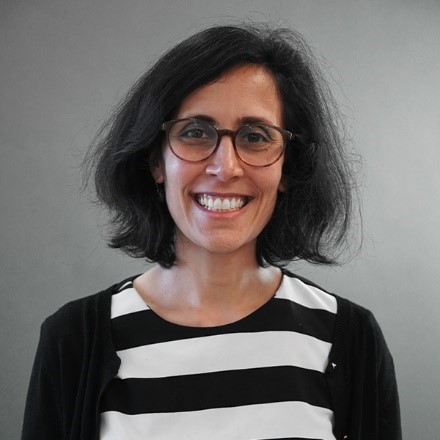
Joice Stipursky
We are focused in investigating the role of drug of abuse (Etanol), protozoans (Toxoplasma gondii) and vírus (SARS-CoV2) exposure to blood brain barrier (BBB) development and function.
I am very grateful to ISN for being one of the CDG awardees. I am currently focused on understanding how the increased consumption of alcoholic beverages during pandemic could be a risk factor to COVID-19 establishment and SARS-CoV2– blood brain barrier (BBB) cells interaction mechanisms. The CDG has helped in the acquisition of materials for cell culture, purified viral proteins, among others, thus being fundamental for the progress of the project and for undergraduate and graduate students´ training. Through this grant, I hope to be able to contribute to relevant knowledge generation, training of qualified students and international projection of reseach projects developed at Institute of Biomedical Sciences (UFRJ-Brazil).
Mauro Cunha Xavier Pinto
We received the ISN Career Development Grant with great satisfaction, and I am honored by this nomination. These resources came at a critical time of budget cuts in our country and brought new hope to our group. This award is especially relevant for the neuroscience field in the Midwest of Brazil, where we are pioneers in neurochemistry studies and neurodegenerative diseases. These resources will allow us to invest in grad student training and to develop new projects in our lab. We are grateful for this award and the opportunity to explore the role of the SLC6 transporters in Alzheimer’s disease pathophysiology.
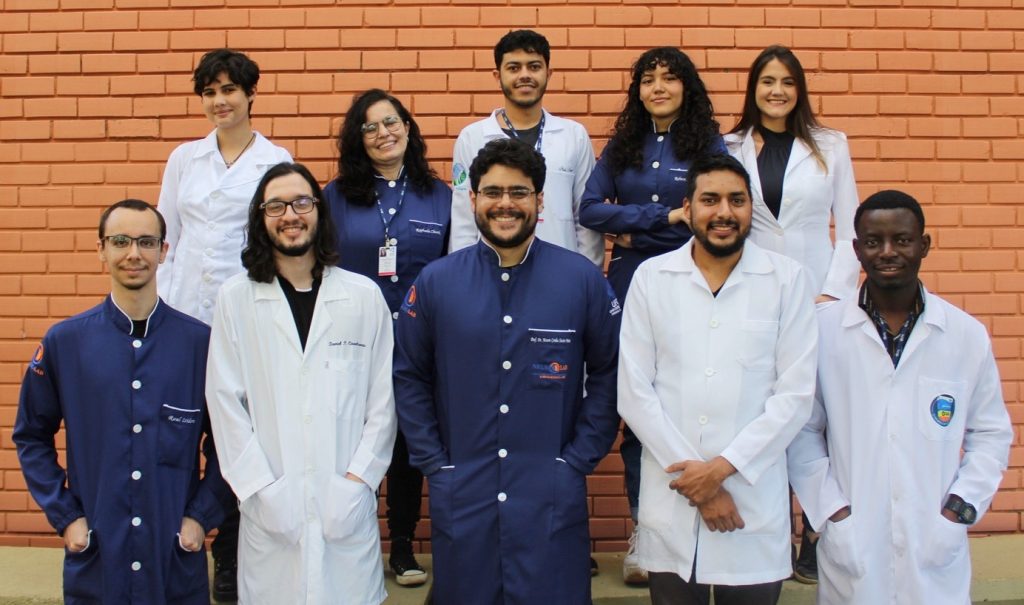
Marta Navarrete
Our lab was established during the pandemic when the world stopped, so the support given by the ISN is not only meaningful but decisive to boost our projects (and motivation). We will acquire new optogenetic and electrophysiology equipment to understand how astrocytes regulate glutamatergic neurotransmission and synaptic plasticity in the Nucleus Accumbes. This region is involved in decision-making and reward, being the gate through which the prefrontal cortex initiates behavioural changes and adaptation. We are very grateful to the Society, and highly value the opportunity to take a step forward towards growing.
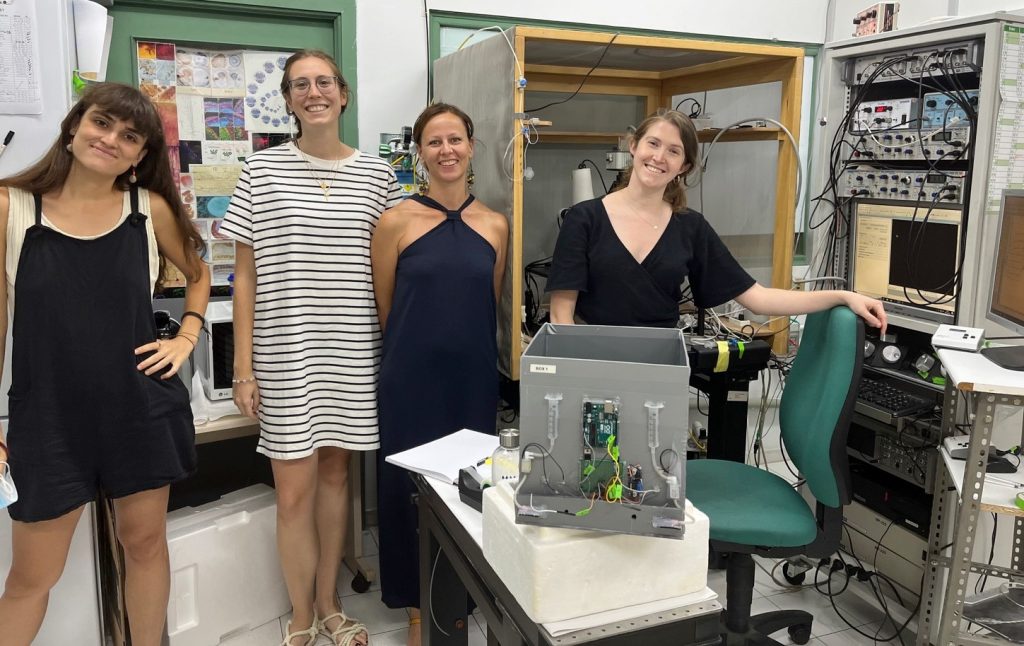
Robyn Brown
The ISN Career Development Grant has been instrumental in providing my laboratory with support to generate key preliminary data for major funding opportunities. This type of assistance is invaluable for junior group leaders such as myself as we typically do not have the capacity to cross fund new projects the same way established investigators can. I want to thank ISN for their commitment to developing the careers of junior investigators. I was unable to attend the 2022 meeting in Hawaii so I look forward to presenting the work supported by this grant at future ISN meetings.
Thank you again ISN! I very much look forward to reconnecting with the ISN membership base at the next meeting.
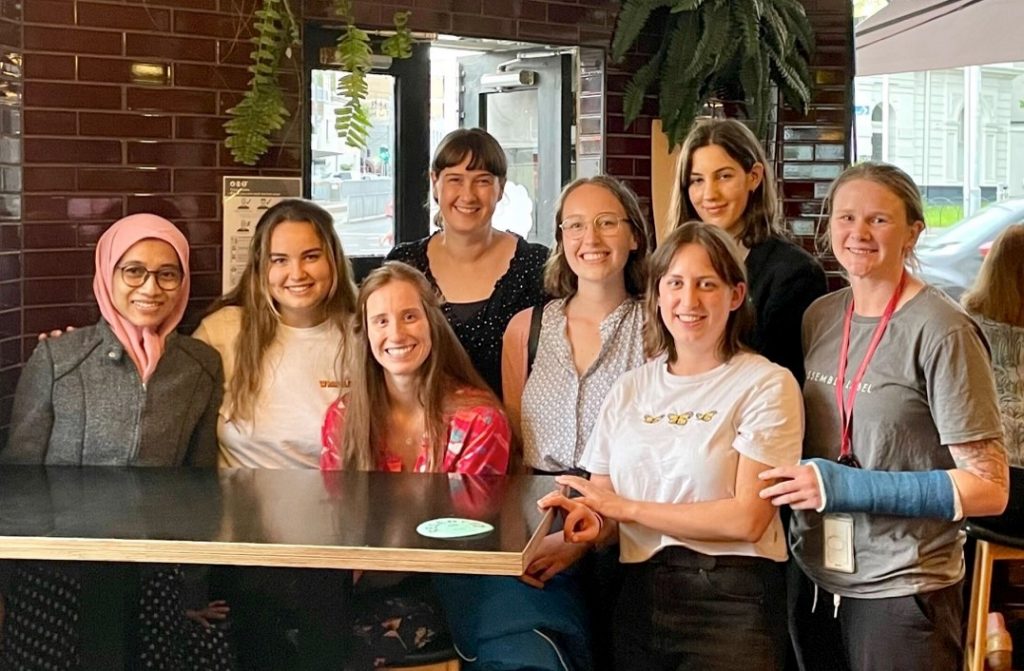
Veronica Baez
We would like to thank the ISN for the CDG grant.
Grin2A mutations lead to complex phenotypes that are related to seizure development. Also, these mutations, in some cases, lead to a decrease in GluN2A levels. In our lab, we assessed for the first time seizure susceptibility associated with decreased GluN2A levels and not related to a particular mutation found in patients.
The ISN CDG allows us to investigate the molecular mechanism that associates GluN2A levels with seizure development. This grant helps us to project better experiments and add two more students to our group. Thanks again ISN!
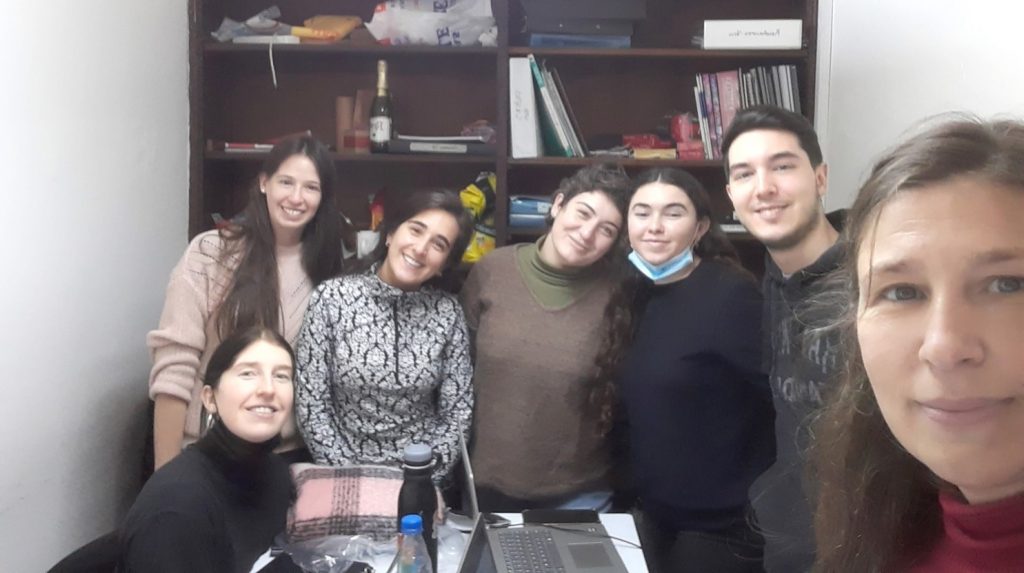
Cleiton Lopes Aguiar
The ISN Career Development Grant helped us acquire materials and equipment for in vivo electrophysiological recordings to investigate the possible relationship between memory deficits and sleep alterations in an experimental model of non-motor symptoms of Parkinson’s disease.
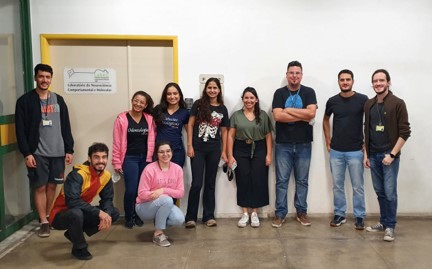
Olamide Adebiyi, DVM, PhD
University of Ibadan · Department of Veterinary Physiology and Biochemistry, Nigeria
https://www.researchgate.net/profile/Olamide_Adebiyi2
“This grant is intended to allow me expand our research methodologies. Quantifying neuro-inflammatory cytokines and proteins has been a challenge before now as I do not have the required equipment despite gaining expertise during my research visit to Cornell University USA. With this grant I hope to purchase an ELISA microplate reader that will serve this purpose. Thus I will be able to demonstrate and equip more scientists with the knowledge I have thereby expanding our capacity. The results from our experiments could bring us a step closer in the discovery of novel therapies that could be useful in demyelinating disorders.”
Mariana Astiz, PhD
Institute of Neurobiology, University of Lübeck, Germany
https://www.neurobio.uni-luebeck.de/mitarbeiter/mariana-astiz.html
“I became member of the ISN soon after obtaining my PhD and I have received support in every step of my career since then. In 2012 the opportunity to participate in a glial cell research school, in 2013 a visit to a laboratory abroad, in 2016 a postdoctoral research fellowship. Now, the ISN is supporting me in the exciting task of starting my own lab. With the CDG, I plan to provide novel insights on a long-standing question: When and how circadian clocks start ticking? This project will significantly benefit my lab’s growth and I am enthusiastic about it.”

Carla Caruso, PhD
Instituto de Investigaciones Biomedicas (UBA-CONICET), Universidad de Buenos Aires, Argentina
https://www.fmed.uba.ar/inbiomed/grupos-de-investigacion
“I sincerely thank the ISN for helping in scientist’s career development through CDG award. This kind of help has a huge impact in countries where resources are not abundant. With this award, I will be able to buy minor equipment needed in my lab that it is expensive for us. Two doctoral fellows will be able to either begin or complete their thesis and two graduate students will be participating in the completion of this project. It will also help us for applying to other grants. It is an extraordinary support for researchers beginning their way as principal investigators in life science.”
Dr. Rachel Hill
Behavioural Neuroscience lab, Monash University, Australia
https://www.monash.edu/medicine/scs/researchers/rachel-hill
“This grant has provided my lab with the opportunity to use innovative new techniques, such as paired local field potential recordings with advanced cognitive testing using touchscreen testing units. The grant also provides project support for a PhD student, allowing my lab to further grow and develop. Finally, the recognition that comes with winning this highly esteemed international award significantly enhances my track record, ensuring I am highly competitive for larger scale funding schemes that will enable significant development of my research program.”
Lin-Koi Ong
School of Pharmacy, Monash University, Malaysia
https://www.monash.edu.my/pharmacy/about/academic-staff/dr.-ong-lin-kooi#tabs__1801776-02
“I would like to acknowledge the International Society for Neurochemistry for funding through the Career Development Grant (CDG) that supported my current research. Over the last few year, my team and our collaborators have made significant discovery in the usage of growth hormone to promote brain recovery after stroke. Importantly, we would like to advance these findings focusing on the translational and clinical aspects. The CDG provides much needed funding for new instrumentation setup and consumables for follow up studies. Further, CDG also supports conference participation as an opportunity to disseminate the research findings, networking and collaboration. The findings of this CDG supported project may provide a new line of treatment to improve functional outcomes and the quality of life for stroke survivors.”
Click here to view the final report

Dr. Christina Perry
Macquarie University, Sydney, Australia
https://florey.edu.au/science-research/scientist-directory/christina-perry
“I am a Research Fellow at Macquarie University, having recently transferred from the Florey Institute of Neuroscience and Mental Health. My research focuses on different aspects of motivated behaviour, from fear and anxiety to reward seeking and addiction. My team and I recently identified a discrete population of cells in the zona incerta – a subthalamic nucleus about which relatively little is known – that seems to be important for inhibition of learned fear. This grant will help me develop an independent research project that will map out the projections from these neurons, and describe their activity patterns during fear expression.”
Click here to view the final report.

Dr. Nicolas Unsain
Instituto Ferreyra, INIMEC-CONICET, Córdoba, Argentina
http://www.institutoferreyra.org/en/see-more-unsain/
“When I first got to know about the newly created ISN Career Development Grant I felt that 2020 would not only bring bad news around the COVID-19 pandemic. Having started my own independent lab just a few years ago, and having recently started to establish the first Drosophila melanogaster Lab in my 75 years-old Institute, those months were a tough test. My perceived level of scientific productivity that is required in this stage of my career wasn´t really helping my sleep. Writing the grant proposal meant focusing again in what I most love, and, funded or not, really helped me getting back my ship towards motivating destinations. The grant obtained from ISN will mean I can rapidly move forward innovative research and produce meaningful tools and data for my project in this new world of Drosophila melanogaster. Indirectly, the support obtained will impact on the research community in Córdoba, since mine is, at present, the sole and only Fly Lab in the province (which is the second biggest city and research hub of the whole country). I find the Society is putting a lot of effort into building a world-wide, inclusive and stimulating Neuroscience community –and I am proud of (as a member) and thankful for (as a grantee) being part of the project.”
Dr. Sara Xapelli
Instituto de Medicina Molecular, Universidade de Lisboa, Portugal
https://imm.medicina.ulisboa.pt/people/sara-xapelli/#intro
“Growing evidence highlights the contribution of adult neural stem cells (aNSCs) as central hubs of neural plasticity with crucial roles in learning and memory but also in stress response and emotional flexibility. In my group we have been studying potential modulators of aNSCs, and we are currently moving forward to integrate our data in animal models of disease and translate it to human studies. ISNCDG will help to gather new data to pursue with our work allowing us to establish as an independent and relevant group in the field of aNSCs.”
Thomas Karikari, PhD
Department of Psychiatry and Neurochemistry, University of Gothenburg, Sweden
